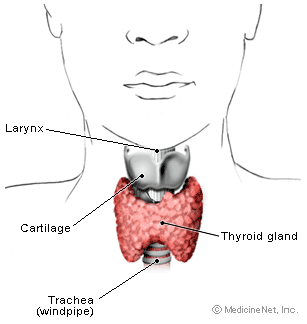Hypothyroid
Most of us think that because of this hormonal imbalance, weight loss is impossible. It may take more time, but weight loss is possible. I have many clients with thyroid conditions lose excess weight(some over 100 pounds). With the medication, having energy and less fatigue; this will improve your quality of life and enable you to focus on other factors contributing to any weight gain.
There is no one hypothyroidism diet per se, but there are some things that will help you avoid gaining weight and to lose weight: such as portion control, making healthy food choices, eating more frequently (smaller meals/snacks) and exercise. Like those who do not have this condition, weight gain is due to consuming more calories then your body requires. With the proper nutrition, exercise, and your medication you can take off excess weight.
Definition:

Your thyroid is a small, butterfly-shaped gland located at the base of the front of your neck, just below your Adam's apple. Hormones produced by the thyroid gland have an enormous impact on your health, affecting all aspects of your metabolism.
As long as your thyroid releases the proper amounts of these hormones, your system functions normally. But sometimes your thyroid doesn't produce enough hormones, upsetting the balance of chemical reactions in your body. This condition is known as hypothyroidism.
Two main hormones
Your thyroid gland produces two main hormones, thyroxine (T-4) and triiodothyronine (T-3). They maintain the rate at which your body uses fats and carbohydrates, help control your body temperature, influence your heart rate and help regulate the production of protein. Your thyroid gland also produces calcitonin, a hormone that regulates the amount of calcium in your blood.
The rate at which thyroxine and triiodothyronine are released is controlled by your pituitary gland and your hypothalamus — an area at the base of your brain that acts as a thermostat for your whole system. The hypothalamus signals your pituitary gland to make a hormone called thyroid-stimulating hormone (TSH). Your pituitary gland then releases TSH — the amount depends on how much thyroxine and triiodothyronine are in your blood. Finally, your thyroid gland regulates its production of hormones based on the amount of TSH it receives.
Although this process usually works well, the thyroid sometimes fails to produce enough hormones. Hypothyroidism may be due to a number of different factors, including:
§ Autoimmune disease (Hashimoto thyroiditis). This is the most common cause of hypothyroidism. Autoimmune disorders occur when your immune system produces antibodies that attack your own tissues. Sometimes this process involves your thyroid gland. Scientists aren't sure why the body produces antibodies against itself. Some think a virus or bacteria might trigger the response, while others believe a genetic flaw may be involved. Most likely, autoimmune diseases result from more than one factor. But however it happens, these antibodies affect the thyroid's ability to produce hormones.
§ Treatment for hyperthyroidism. People who produce too much thyroid hormone (hyperthyroidism) are often treated with radioactive iodine or anti-thyroid medications to reduce and normalize their thyroid function. However, in some cases, treatment of hyperthyroidism can result in permanent hypothyroidism.
§ Radiation therapy. Radiation used to treat cancers of the head and neck can affect your thyroid gland and may lead to hypothyroidism.
§ Thyroid surgery. Removing all or a large portion of your thyroid can diminish or halt hormone production. In that case, you'll need to take thyroid hormones for life.
§ Medications. A number of medications can contribute to hypothyroidism. One such medication is lithium, which is used to treat certain psychiatric disorders. If you're taking medication, ask your doctor about its effect on your thyroid gland.
Less often, hypothyroidism may result from one of the following:
§ Congenital disease. Approximately one in 3,000 babies in the United States is born with a defective thyroid gland or no thyroid gland at all. In most cases, the thyroid gland didn't develop normally for unknown reasons, but some children have an inherited form of the disorder. Often, infants with congenital hypothyroidism appear normal at birth. That's one reason why most states now require newborn thyroid screening.
§ Pituitary disorder. A relatively rare cause of hypothyroidism is the failure of the pituitary gland to produce enough TSH — usually due to a benign tumor of the pituitary gland.
§ Pregnancy. Some women develop hypothyroidism during or after pregnancy (postpartum hypothyroidism), often because they produce antibodies to their own thyroid gland. Left untreated, hypothyroidism increases the risk of miscarriage, premature delivery and preeclampsia — a condition that causes a significant rise in a woman's blood pressure during the last three months of pregnancy. It can also seriously affect the developing fetus.
§ Iodine deficiency. The trace mineral iodine — found primarily in seafood, seaweed, plants grown in iodine-rich soil and iodized salt — is essential for the production of thyroid hormones. In some parts of the world, iodine deficiency is common, but the addition of iodine to table salt has virtually eliminated this problem in the United States.
Excerpts from Mayo Clinic Literature
 | 









